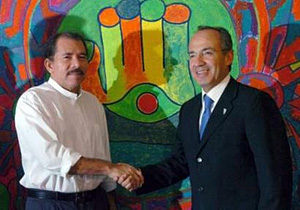 |
 |
 |
 Editorials | Issues | January 2007 Editorials | Issues | January 2007  
Calderon's Crusade on Drugs in Mexico Rises Above Rest
 Carlos Luken - MexiData.info Carlos Luken - MexiData.info


| | Nicaragua's President-elect Daniel Ortega (L) shakes hands with Mexico's President Felipe Calderon after Calderon arrived in Managua, Nicaragua January 10, 2007. Calderon is in Nicaragua to attend Ortega's inauguration on Wednesday. (Reuters/Alfredo Guerrero) |
Tijuana residents were surprised last week as they encountered Mexican military roadblocks along routine commuter routes and on most important city streets.

The heavily armed soldiers are part of Mexican President Felipe Calderon's second phase in a no-nonsense crackdown on violence and savagery caused by drug cartel rivalries over control of several Mexican cities designated as vital smuggling routes to the United States.

After only a month in office, corruption and incompetence among local police authorities encouraged Calderon to increase Mexico's military budget by a momentous 20 percent, and to use 3,000 soldiers, marines and federal police officers to make good on his campaign promise to restore law and order to his crime stricken country.

"Operation Tijuana" was launched just weeks after Calderon deployed troops to Michoacan, where federal authorities destroyed marijuana crops and seized tons of harvested pot.

As in other cities, Tijuana has experienced escalating violence with rising numbers of kidnappings and murders, and victims ranging from police officers to drug traffickers to innocent bystanders.

However Calderon's show of force is being questioned by various observers and organizations that see his actions as simply another public relations ploy taken at the beginning of most administrations to calm public criticism.

They cynically assert that actions such as these are normally abandoned after a short time as police encounter heavier resistance from organized crime, or are overwhelmed by simultaneous violence that springs up countrywide as rival cartels opportunistically invade territory where others are being harassed. So what makes Calderon's crusade different?

To begin, Calderon is putting his reputation on the line by resolving to retake hostage states and cities by acting immediately upon taking office. He has not lost time, as have other presidents, by giving local authorities the benefit of the doubt concerning dishonesty. He is acting resolutely with the military, and eventually he will entrust the duties with law enforcement authorities with proven merits.

This is a concerted effort involving civilian, justice ministry and military authorities. And the members of the armed forces charged with these dangerous missions are from well-trained and coordinated units, from different service branches, who are now better armed. As well, they are supported by 20 planes, 10 helicopters and 30 boats.

As opposed to conventional efforts, Calderon appears to be following a strategically planned campaign by taking action against all of the cartels simultaneously, which forces existing crime organizations to go underground and dissuades rivals from moving from one territory to another.

Will Calderon's campaign yield long-lasting results?

While it is hard to predict at this early stage, the military presence should allow a respite for communities as criminals will likely go underground to avoid clashes with the military. Others may migrate to regions where enforcement is still lax.

This possibility has raised cries of outrage by state governors. Sonora Gov. Eduardo Bours quickly voiced fear that outcasts from Tijuana may find their way to his state and take a more active role leading to a more violent environment.

Partisanship also emerged, as federal officials made claims of "functioning responsibility" against Tijuana Mayor Jorge Hank, alleging he is indifferent towards police corruption. Hank, who is seeking the Institutional Revolutionary Party's gubernatorial candidacy in this year's Baja California elections, accepted the municipality's accountability while evasively shifting responsibility to past National Action Party (PAN) administrations.

Conversely, the campaign is being praised by the people of Tijuana and its business community. Business leaders especially have been prime targets in the city's ongoing kidnappings, which have forced many families to move to safer living conditions in nearby San Diego.

Although the Michoacan campaign yielded few important cartel operative arrests, it is expected that a sustained crusade with honest local, state and federal coordination, and supported by intelligence networks that are being established, will in time generate important drug lord apprehensions. The Calderon campaign may also benefit from a surge of positive public opinion from besieged citizens in violence-torn Mexican states. Curiously, it may also benefit from an upswing in U.S. public and law enforcement opinion, insofar as the campaigns will have a deterrent effect on illegal immigration in border states.

In short, Felipe Calderon has weighed the crucial threat and frightening consequences of crime and violence on Mexican society and its political system. And he has thus declared war on organized crime, gangs and corrupt officials, so as to recover not only Mexico's cities and states but too its neighborhoods and streets.

ilcmex@yahoo.com - Carlos Luken is a columnist for MexiData.info. | 
 | |
 |



